To call “The 48 Laws of Power” controversial is a big understatement. Critics claim the book promotes toxic behaviour, manipulation, and mind games. Some call it a manual for narcissists, sociopaths, and disciples of dark psychology.

You might expect the author and publisher to deny these accusations. But they don’t. The first words on the back cover of this New York Times bestselling book proudly describe it to be “amoral, ruthless, and cunning.”
Robert Greene says power games are simply a reality of human nature, even though nobody really talks about it. So we have a choice: We can remain naive and get taken advantage of, or we learn the 48 laws for self-defence.
In short: Use this book as a shield, not a sword.
And remember, these laws apply to the fiercely competitive worlds of corporate and political power, where certain ruthless behaviours are normal. They were never meant to be relationship advice—trust me, it won’t end well!
Who is Robert Greene?
Robert Greene is a very popular American author known for his books on strategy, power, and seduction. His writing reflects a deep study of history, combined with psychology and philosophy. He’s written six international bestsellers, including “The 48 Laws of Power,” “The Laws of Human Nature,” “The Art of Seduction,” and “Mastery.”
🦁 1. The Complete List: What are the 48 laws of power?
Here’s an overview of all of the 48 laws of power explained in simple, modern English:
- Law 1: Always Make Your Superior Look Good.
Don’t show off your own talents or intelligence. That can make them feel jealous and insecure, leading to negative consequences for you. - Law 2: Never Trust Anyone Completely.
Friends can let you down. Hiring former enemies can be smarter; they have more to prove. - Law 3: Never Reveal Your Intentions.
Hide your real plans to prevent others from interfering or sabotaging them. - Law 4: Speak Less.
Talking less helps you remain in control by not revealing too much. You’ll also avoid saying things you later regret. - Law 5: Protect Your Reputation.
Your reputation is key. Build it carefully, as it’s easily lost. - Law 6: Seek Attention, Stand Out.
Remaining visible and talked about increases your power. Being unnoticed quickly leads to being forgotten. - Law 7: Claim Credit For Other’s Work.
Advance faster by taking credit for others’ efforts and achievements. - Law 8: Don’t Chase People.
Pursuing others puts you into a weak position. Instead, draw them towards you. - Law 9: Act, Don’t Argue.
Convince others through actions rather than words. It’s more effective and there is less risk of offending them. - Law 10: Evade Miserable and Unfortunate People.
Their negativity can bring you down, too. Instead, stay close to the happy and successful. - Law 11: Become Indispensable.
Make sure others depend on you for their success and happiness, giving you power. - Law 12: Use Honesty Strategically.
Unexpected honesty and gifts can win over even very suspicious people. - Law 13: Highlight “What’s In It For Them.”
People are more responsive when you appeal to their self-interests rather than their altruism. - Law 14: Act Friendly To Gather Intel.
Keep your real motives hidden under a friendly front. People will lower their guard and be more likely to spill valuable information. - Law 15: Destroy Opponents Completely.
If you must go to war, finish off your enemies totally. Giving them a chance to recover can lead to retaliation. - Law 16: Increase Your Value Through Scarcity.
When you’re not always available, people’s appreciation of you goes up. They don’t take you for granted. - Law 17: Remain Unpredictable.
Keep people guessing what you’ll do next. It makes you more interesting and resistant to manipulation. - Law 18: Avoid Isolating Yourself.
Step out and connect with others to remain informed and involved, preventing vulnerability. - Law 19: Don’t Offend the Wrong Person.
Always know who you’re talking to and what their status is, or you could suffer the consequences. - Law 20: Keep Your Options Open.
Never fully commit to any one side, except your own. Staying neutral helps you end up the ultimate winner. - Law 21: Play Dumb.
Sometimes, appearing less intelligent than you are can give you the upper hand. It can make others overconfident, dropping their guard. - Law 22: Use Surrender as a Tool.
Rather than signifying defeat, surrender can give you time to recover and win later. - Law 23: Focus Your Efforts.
Direct your energy and resources where they have the greatest effect. Efforts spread too thin are often ineffective. - Law 24: Be Subtle and Discreet.
Use indirect influence tactics that don’t raise suspicions. Offer flattery, show respect to superiors, and assert power subtly. - Law 25: Constantly Reinvent Your Image.
Change and adapt your persona over time to keep yourself interesting and relevant. - Law 26: Maintain a Spotless Reputation.
Use other people to do your dirty work, preserving your clean public image. - Law 27: Exploit the Desire for Belief.
Tap into people’s longing for something to believe in to build a loyal following—By becoming a symbol for their beliefs or aspirations. - Law 28: Move Decisively.
When you act, do it with confidence and authority, which commands respect. Hesitation is often perceived as weakness. - Law 29: Anticipate Potential Obstacles.
Make a detailed plan that includes thinking ahead about any problems or hurdles you might face on the way to your goal. - Law 30: Make Your Successes Look Easy.
This can make your accomplishments seem even more impressive, creating an aura of power and competence. - Law 31: Limit Their Choices.
Control the situation by manipulating the options available to others, giving them the illusion of freedom while remaining in control. - Law 32: Cater to People’s Delusions.
Many people enjoy escaping into their own fantasies and aspirations. Aligning with these will help you capture their attention and loyalty. - Law 33: Identify Their Weak Spot.
Everyone has vulnerabilities. Find them and use them to your advantage. - Law 34: Carry Yourself Like a King.
How you present yourself can greatly influence how you are treated. Project an image of royalty or greatness in your behavior. - Law 35: Time Your Actions Perfectly.
Acting at the right moment can be more effective than having the best ideas or being the most talented. - Law 36: Ignore What You Can’t Have.
Show indifference towards things beyond your reach. Focus on attainable goals and desires. - Law 37: Stage Dramatic Events.
By creating grand displays and memorable events, you can keep the public focused on what you’re doing. - Law 38: Think Independently, Act Conformingly.
Hold your own beliefs, but adapt your behavior to match those around you. This prevents conflict and keeps you from drawing unwanted attention. - Law 39: Create Chaos to Gain Advantage.
In the midst of turmoil, when people feel uncertain or confused, they often make mistakes or reveal secrets. - Law 40: Beware Free Gifts.
Be suspicious of whatever comes to you without effort or cost. It will often have hidden strings attached or lead to your own complacency. - Law 41: Avoid the Shadow of Greatness.
Be cautious taking on positions previously held by exceptionally accomplished individuals. Direct comparisons to them can overshadow your achievements and create expectations that are difficult to meet. - Law 42: Target Group Leaders.
The most effective way to deal with a group is to focus on influencing or removing their leader. - Law 43: Appeal to Both Mind and Heart.
Win people over completely by speaking both to their emotional needs and their intellect. - Law 44: Disorient Others With Imitation.
By copying or mirroring the actions of others, you can confuse and unsettle them, making them easier to sway or influence. - Law 45: Implement Change Gradually.
While people like the idea of change, in practice they will resist if you change too much, too quickly. - Law 46: Show Your Imperfections.
Keeping your flaws visible makes you more relatable and prevents evoking jealousy in others. - Law 47: Recognize the Finish Line.
Once you’ve secured a win, be careful not to overextend beyond your success. Knowing when to stop prevents turning a victory into a failure. - Law 48: Be Like Water.
Avoid locking yourself into a single strategy or image. Being adaptable allows you to survive changing circumstances and take advantage of emerging opportunities.
Okay, those are the 48 laws of power, summarized in a couple of sentences each! Next we’ll dive deep into the biggest themes and takeaways from these laws…
👑 2. Never Threaten Their Ego: To master the game of power, respect your superior’s pride and sense of importance
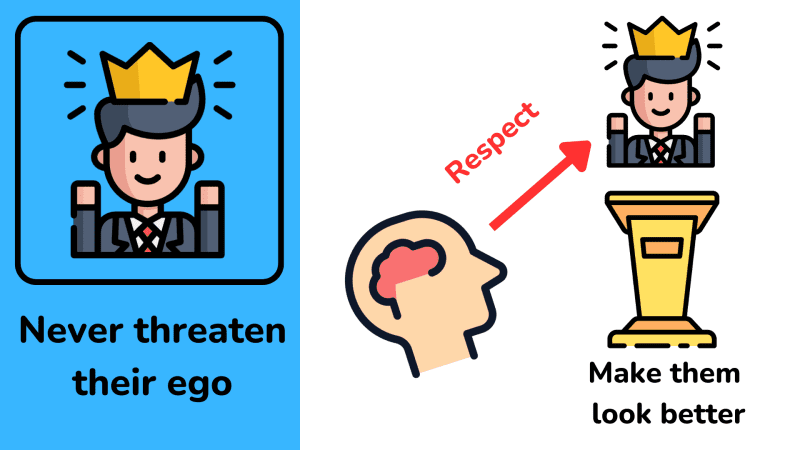
To master the game of power, you must respect your superior’s sense of importance. Instead of impressing them with your own accomplishments, focus on making them look better than you. Most of all, avoid offending their pride
In France during the 1600’s, King Louis XIV had a finance minister named Nicolas Fouquet. One day, Fouquet threw a grand, luxurious party at his mansion. He wanted to impress his boss the King and secure his position in the government. But this move backfired.
The King viewed Fouquet’s wealth and popularity as threats to his own power, worrying Fouquet may become his rival for the throne. The next day, Fouquet was arrested and imprisoned for life. The King then hired Fouquet’s chief architect and decorator to build for him the grander Palace of Versailles.

This is a perfect historical example of Law 1 from “The 48 Laws of Power”: Always Make Your Superior Look Good. It’s about recognizing their position and boosting their image—making them appear better than they are.
Most of us aim to impress those above us, like our boss, by proving our competence and intelligence. But overdoing this can become a risk, when we overshadow our superior, making them feel insecure. It’s a fundamental part of human nature: people have egos, and making them feel threatened can cost us dearly.
Similar laws from The 48 Laws of Power:
- “Law 21: Play Dumb” tells us to let others feel smart and in control. Proving your intelligence is often the quickest way to make enemies, not friends.
- “Law 38: Think Independently, But Act Conformingly” advises against standing out too much. It stirs up insecurity. Act like those around you. It makes them feel comfortable, feeling their views are shared.
The classic success book “How to Win Friends and Influence People” by Dale Carnegie is perfectly aligned with this philosophy. That author said, “When dealing with people, let us remember we are not dealing with creatures of logic. We are dealing with creatures of emotion, creatures bristling with prejudices and motivated by pride and vanity.“
The first rule in that book is “Don’t criticize, condemn, or complain.” Why? Because it’s an ineffective strategy! Even the worst criminals in prison don’t condemn themselves for anything. Take Al Capone, perhaps history’s most infamous gangster, who claimed he was only trying to help people have a good time. So when we directly criticize others, we do not cause them to change their ways. Usually, we only provoke their resentment, causing them to justify themselves or condemn us in return.
Read more in our summary of How to Win Friends and Influence People
In short, we should always avoid offending the ego, pride, and vanity of those above us. Make them look better than us. This is key to building our own power and influence.
🤐 3. Speak Less: Controlling your tongue will help you appear strong and avoid making blunders
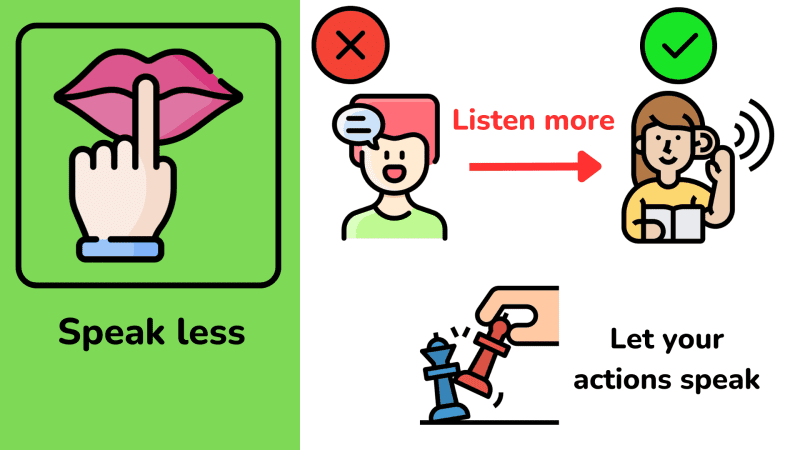
Stay in control and preserve your influence by holding back and listening more. Controlling your tongue lets you avoid making mistakes. Master the art of silence and let your actions speak for you.
In the 1500s in Florence, Italy, Michelangelo was completing his statue of David, now universally celebrated as a masterpiece. Back then, a man named Piero Soderini, an influential politician and patron of the arts, came to inspect the work. Soderini remarked the statue’s nose was too large.
Michelangelo knew it was simply the perspective from where Soderini was standing. But he decided not to argue. Instead, he climbed up to the nose with his chisel and a some marble dust hidden inside his hand. Pretending to adjust David’s nose with the chisel, he let some of the dust fall from his hand to the ground where Soderini was standing.
After a few minutes of this performance, Michelangelo stepped aside and asked for Soderini’s opinion, who now proclaimed it to be perfect. Michelangelo understood the value of saying less, skillfully avoiding getting into an argument and conflict with a powerful figure. It’s a beautiful illustration of Law 4: Speak Less, from The 48 Laws of Power.

Some key points:
- Speaking less often shows strength. Have you ever noticed that many powerful figures—be they historical Kings, CEOs, or famous artists—often speak less? They may even reply in vague statements or riddles, but their words have more weight?
For example, when King Louis XIV was presented with news, he would often simply reply with “I shall see.” This brief response kept his intentions hidden, buying him time to decide on the best course of action. - Patience will help you control your tongue. In The 48 Laws of Power, Robert Greene says patience is not a natural talent, but a skill we can develop with practice. Patience will help us avoid speaking impulsively, saying things we can’t take back.
- Ignoring people is better than getting angry. When others are able to provoke strong emotions in us such as anger, that gives them power over us. Simply creating distance between you and the other person builds your position of strength and puts you back in control.
If you want to cultivate your inner strength and control, then look into the philosophy of Stoicism. It teaches a mindset of accepting what we can’t control in life, while changing what we can. 2,000 years ago, Marcus Aurelius, a top Stoic philosopher, summed it up nicely: “You have power over your mind — not outside events. Realize this, and you will find strength.”
One thing we never have direct control over is how other people are. So we can either accept that people will be difficult and flawed, or we can refuse that fact and live the rest of our lives in frustration and misery. Marcus Aurelius wrote, “Begin each day by telling yourself: Today I will meet people who are meddling, ungrateful, insolent, disloyal, malicious and selfish—all because of their ignorance of what is good and evil.”
To sum it up: Speak less, control your tongue. This increases your influence. Mastering the art of holding back, using silence as a tool, instead letting your actions speak.
🕵️ 4. Never Trust Anyone Completely: Being strategic about your professional relationships; keeping friendships separate

This may sound negative, but it’s really about being careful and strategic. For example, it’s usually a good idea to keep professional relationships and personal ones separate.
In the 9th century, Emperor Michael III of Byzantium was known for his military wins and his heavy drinking. He had a close friend, Basil, who he brought up from a simple life to be rich and powerful, even making him a co-emperor. This makes what happened next really shocking…

Michael completely trusted Basil and thought he would always be loyal because of their friendship and everything he had given him. But Basil wanted more for himself and made a secret plan against Michael.
One night, while Michael was asleep, Basil and some others sneaked into his room. They shockingly killed Michael and then Basil took over, becoming the only ruler of Byzantium. This story shows how the desire for power can ruin even strong friendships, teaching us that sometimes it is best to follow Law 2: Never Trust Anyone Completely.
Some key points:
- The context: Keep work and friends separate. Robert Greene defends this law in some interviews by saying it applies more to the professional sphere. It’s often a terrible mistake to hire a friend that you trust in a work position. When you need to get results, focus not on your feelings towards the person, but your practical need to hire a person that is skilled and competent.
- Law 20: Keep your options open. Not becoming too entangled to any one side can help you come out on top. Powerful people tend to be committed to one person: themselves. In The 48 Laws of Power, a classic example is Queen Elizabeth I of England, who skillfully avoided making firm commitments to various kingdoms and marriage suitors, which kept England remarkably stable in a period of religious and political turmoil.
- Law 40: Beware Free Gifts. A gift that seems free or without strings attached can still be used to manipulate or control you. It often creates an unspoken agreement or obligation, leading us to feel a sense of debt, and be more likely to say yes to requests later that we don’t want to. King Louis XIV would often use gifts strategically, giving expensive paintings to distant acquaintances, putting them in a position of feeling compelled to return the favour to the King.
In Robert Cialdini’s book “Influence: The Psychology of Persuasion,” a key principle is the rule of reciprocity. Professor Cialdini explains that the rule of reciprocity states that when someone does something for us, we feel compelled to return the same kind of favour, gift, invitation, etc.
One memorable example from that book is the case of the Hare Krishna Society, which saw a big increase in public donations after they began giving out small items, like a flower or book, to people passing by.
Law 2 says “Never Trust Anyone Completely,” advising a strategic and cautious approach to relationships, particularly professional ones. Remain uncommitted to one side, beware free gifts, and keep separate your friendships and emotional ties.
🎭 5. Never Reveal Your Intentions: Don’t let anyone know what you’re against and what you’re for
In today’s world, where competition is fierce, there’s a real advantage in keeping your intentions and strategies secret. Cloaking your true intentions helps you remain unpredictable—a step ahead of your adversaries in your career or business. This is Law 3: Never Reveal Your Intentions.

Since the time of Steve Jobs, Apple is known for its secretive corporate culture and tight control over information related to its product development. Any leaks of information dilute the impact of a new product launch and give competitors valuable time to prepare their counterattack.
Being too secretive can arouse suspicions. This law is more about misdirection—sharing plenty about your goals and plans, but much of it being false.
During World War 2, the Nazi bomb attacks on London were significantly less devastating than they could have been, often missing their targets. The Germans relied on secret agents in London to fix their targets, but unbeknownst to them, those agents had been replaced by English-controlled agents feeding them wrong information.
Law 12: Use Honesty Strategically, is closely related to this. Telling the truth at the right time, especially when it’s unexpected, can lower other’s guards.
Take the story of Count Victor Lustig, a notorious con artist, who borrowed $50,000 from the gangster Al Capone because he promised to double the money in a business deal. Instead, he put the money in a safe deposit box for two month, then returned the full amount to Capone, claiming the deal failed. Capone, impressed by the man’s apparent honesty, rewarded him $5,000, falling right into Lustig’s clever trick.
In war, politics, and business, you may be surrounded by competitors looking to predict your next move, so they can defeat you. In those situations, it makes sense to keep your plans hidden, even revealing some false information to misdirect your adversaries.
🌟 6. Shape Your Reputation: Creating, maintaining, and protecting your public image
In the late 19th century, Thomas Edison and Nikola Tesla were rival inventors.

Edison was not only an inventor but also a shrewd businessman—he understood the value of promoting himself and his work. He did all he could to always remain in the public eye, such as talking about futuristic robots and mind-reading machines.
Tesla, on the other hand, was a brilliant inventor but paid almost no attention to self-promotion.
Edison championed an electricity system called direct current (DC) and viciously attacked Tesla’s competing system of alternating current (AC). He conducted a smear campaign, electrocuting various small animals with AC current to prove how dangerous it was compared to DC. In the end, Tesla’s AC system became the standard we use today, but Tesla died in obscurity and poverty.
This story is a vivid illustration of Law 5: Protect Your Reputation. Edison’s active management of his public image and reputation led to enduring fame and success, while Tesla’s neglect of the same aspects contributed to his sad ending.
Some related points:
- Law 18: Avoid Isolating Yourself. Human power relies on social networks, and that requires continual engagement with others. A prime example of this was King Louis XIV’s daily ritual called “lever,” where over 100 nobles attended his morning routine. This practice ensured the King stayed at the very center of his kingdom’s workings, keeping informed and engaged with the key figures who supported his reign, helping sustain his power and influence.
- Law 26: Maintain a Spotless Reputation. Whenever possible, powerful figures find others to do their dirty work, or to serve as the scapegoat for bad news. In the year 1500, Cesare Borgia captured a northern part of Italy for his father, Pope Alexander. To bring order to the lawless region, he appointed a vicious general named Remirro de Orco. When control was established, Borgia publicly executed de Orco, distancing himself from his lieutenant’s brutal acts.
- Law 6: Seek Attention, Stand Out. Have people talk about you through being different, unpredictable, intriguing. As far as power goes, it is better to be attacked and criticized than to be forgotten…
In 2016, Donald Trump went from having zero political experience to being the President of the United States. A pillar of his campaign were comments that many found shocking and controversial. In his book The Art of the Deal, Trump confirms this is a deliberate strategy: “Good publicity is preferable to bad, but from a bottom-line perspective, bad publicity is sometimes better than no publicity at all. Controversy, in short, sells.”
When it comes to power, it is critical to actively manage your reputation. Beginning with seeking attention through self-promotion, even controversy. To maintain your public image, stay connected to powerful social networks and let other do your dirty work.
🎩 7. Be Audacious: Projecting a mask of confidence and embracing the theatre of life
Think of the social world as a big stage. When you step into the public world, you’re like an actor, putting on a mask to play your part. This isn’t about being deceptive, but embracing the aspect of life that is performance and drama.

This is about understanding that appearances are crucial. People judge based on how you look, talk, and act. In an ideal world, only our inner qualities would matter, but reality dictates that we play the game if we want influence.
Once you’re offstage, in the privacy of your home with the ones you love, then you can be your true self. Robert Greene says people used to understand this concept, but today we struggle to accept it, and as a result end up having all kinds of neuroses.
Some key points:
- Law 28: Move Decisively. In the game of power, your actions should exude boldness and decisiveness. Like a painter making large, bold strokes of colour on the canvas. When you enter action with timidness, you convey weakness and timidness.
- Law 34: Carry Yourself Like a King. If we don’t project self-respect and confidence in ourselves, then how will anyone else respect us? This is one reason Arnold Schwarzenegger jumped straight from being a bodybuilder with a thick accent to a Hollywood leading man. He trusted himself and saw himself from the beginning as deserving of those leading roles.
- Law 37: Stage Dramatic Events. If life is a drama, then creating memorable events is one of the best ways to solidify your influence. You capture attention and gain control over your narrative, with a well-timed spectacle.
Mastering power requires playing a part with boldness, like a theatre actor. This includes taking action with boldness, planning impressive spectacles, and carrying ourselves like a King (or Queen).
🧲 8. Don’t Chase People: You maintain power in the situation by letting them come to you
In the dance of power, letting others come to you is usually the more effective strategy than pursuing them. The best way to gain what you want is not to chase it but to attract it. Gaining power in a situation often involves making a paradoxical move: stepping back to draw others in. This is neatly summed up in Law 8: Don’t Chase People.

A couple related points:
- Law 16: Increase Your Value Through Scarcity. Once you’ve established your presence in a group or a relationship, strategically withdrawing can make you appear more valuable and sought after. It’s the classic case of ‘playing hard to get,’ where your perceived rarity increases your appeal.
In the book Influence by Robert Cialdini that we mentioned before, he explains how the principle of scarcity is often used in sales and marketing. From selling diamond rings to McRibs, people want more what they cannot easily get. - Law 36: Ignore What You Can’t Have. In our modern world, scrolling through social media can often trigger a serious cases of FOMO (fear of missing out). We can reconnect to feeling strong about ourselves by embracing a more Stoic philosophy, understanding that happiness generally comes not from getting more but wanting less.
We often feel like chasing what we want, be it a powerful ally or a love interest. Yet, it’s usually smarter to hold back and let them come to us. Being less available can actually make us more desirable.
💧 9. Be Like Water: Staying adaptable and unpredictable to maintain our influence
Be like water; water has form and yet it has no form. It is the softest element on earth, yet it penetrates the hardest rock. It has no shape of its own, yet it can take any shape in which it is placed.
— Bruce Lee
Life is unpredictable and endlessly complex. What worked yesterday may not work today. We cannot remain rigidly devoted to a strategy or “law of power” that no longer applies.

The game of power requires that we stay flexible and adaptable with our approach. So we can respond effectively to changing situations and power dynamics. Robert Greene considers this the most important law. It is Law 48: Be Like Water.
A couple related laws:
- Law 17: Remain Unpredictable. When people are unable to anticipate what you’ll do next, it makes you more interesting to friends and protected against opponents. You will become harder to manipulate and strategize against.
A perfect illustration is the story of Bobby Fischer’s victory in the 1972 Chess World Championship. Fischer won against the grandmaster Boris Spassky by being unpredictable and chaotic, even making deliberate errors. This strategy kept Spassky off-balance, unable to predict or counter Bobby Fischer’s moves effectively. - Law 25: Constantly Reinvent Your Image. To stay relevant and influential, our public image can be always evolving. Just like water takes the shape of its container, we should be responsive to our cultural environment. The music artists David Bowie and Madonna are both masters of reinvention, constantly changing their musical styles and appearances, to keep fans engaged and intrigued.
In short, being like water – adaptable and flexible – is crucial in the game of power. Being open to change is how we navigate the unpredictable reality of life and power dynamics. This also makes us more interesting and difficult to manipulate.
- Avoid direct criticism. When disagreeing, especially with superiors, do so subtly without directly challenging someone’s ego. By asking leading questions, you can often change someone’s mind, while making them feel it was their idea all along. (similar to the Socratic Method)
- Pause for 2 seconds before responding. Take a moment before you speak to avoid making impulsive remarks you later regret and to practice Law 2: Speak Less.
- Be more vague in your answers. When asked about your plans or stance on issues, the best response may be a broad, non-specific answer. This helps you keep your intentions hidden, in case someone at your work may be trying to steal your idea or position.
- Update your online presence. Regularly check what Google results for your name show. Update your social media profiles to reflect the image you want people to find about you.
- Move like a King or Queen. Some today would say “like a boss.” Practice posture and gestures that convey confidence. Maybe watch a video of a charismatic actor you admire and copy their movements in your mirror. Another aspect of this is wearing clothes that make you feel great and powerful.

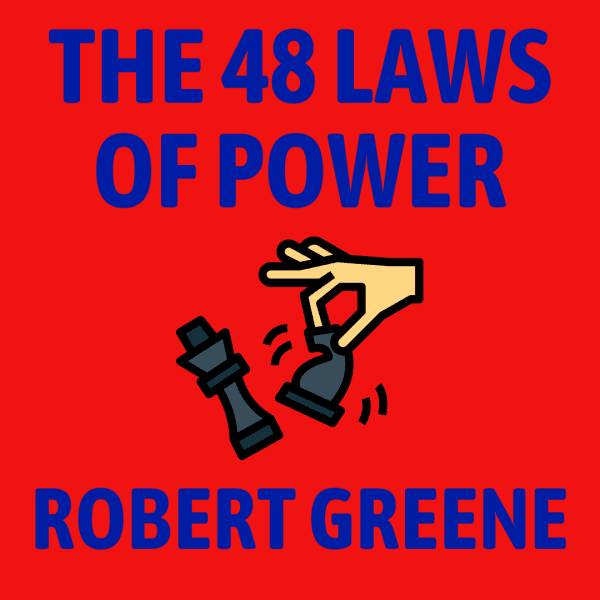
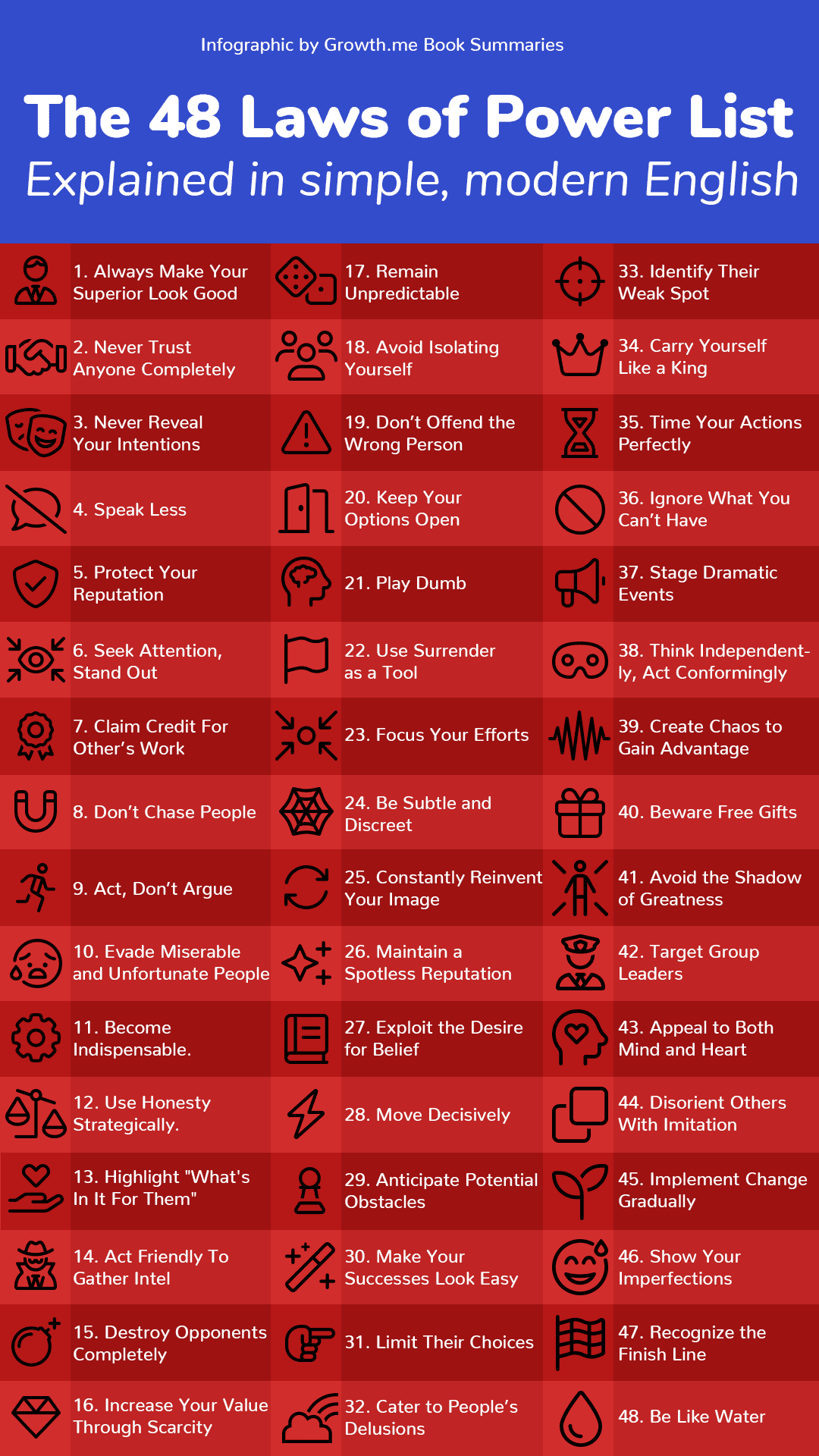




















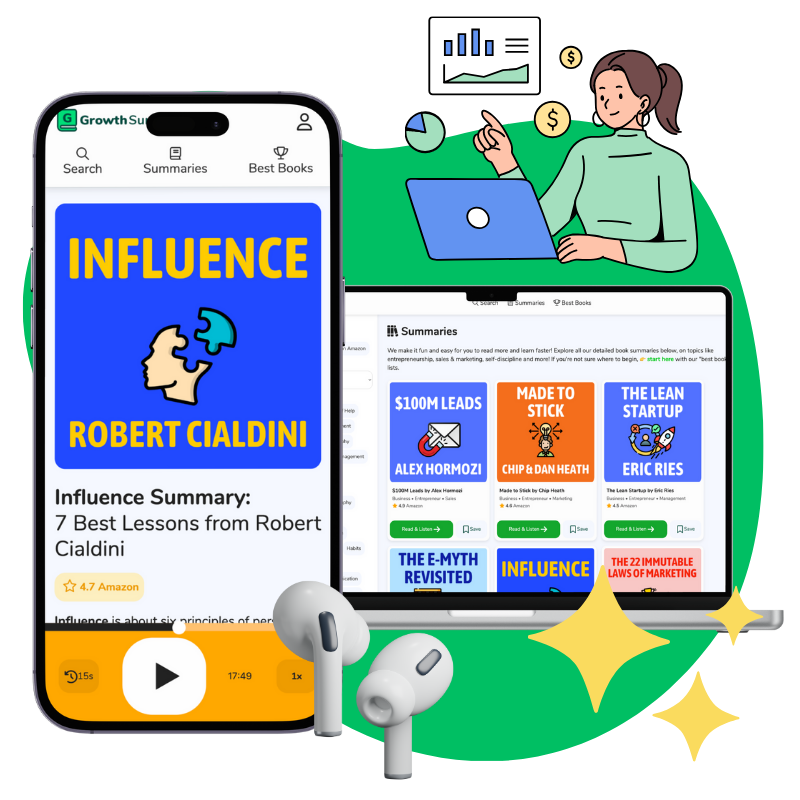










Community Notes